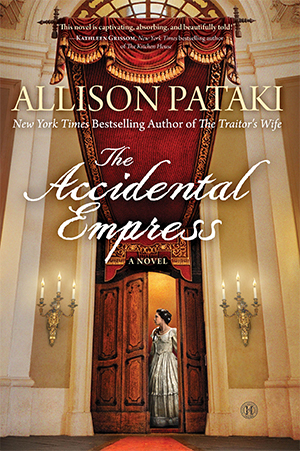Chicago author Allison Pataki cannot be slowed down. Regarded as a “force in historical fiction,” this New York Times best-selling author published her first two novels within a year of each other, and has already begun to tackle her next, highly anticipated project, a sequel to “The Accidental Empress.”
Marrying history and fiction in an edifying manner, Pataki’s novels ignite the unexpected romantic in us all. Her most recent work, “The Accidental Empress,” follows the story of Austro-Hungarian Empress Sisi through her stormy love affair with Emperor Franz Joseph. Better yet, the intricately plotted novel includes a personal touch. Pataki herself has familial ties to the former Habsburg Empire of Austria-Hungary, the crux of Sisi’s captivating story.
Pataki gushed with Make It Better on all things historical fiction, life in Chicago, and her impressive philanthropic involvement.
 Make It Better: Your two novels, “The Traitor’s Wife” and “The Accidental Empress,” are both stunning works of historical fiction. In that genre, where do you draw the line between fact and fiction?
Make It Better: Your two novels, “The Traitor’s Wife” and “The Accidental Empress,” are both stunning works of historical fiction. In that genre, where do you draw the line between fact and fiction?
Allison Pataki: As the writer, that is quite possibly the most difficult part of the process…take “The Accidental Empress.” I decided early on that I would be crazy not to rely heavily on the historical record for plot and character development in “The Accidental Empress.” The raw material—a love triangle! An empire divided! An incredibly overbearing mother-in-law! Infidelity! Waltzes!—was all so good and intriguing. I believed that the history of Sisi’s life and time period provided all of the fixings to create a really compelling novel. But as this is a novel and not a biography, I had the creative space to pull not only from the proven facts, but from the mythology and reports as well.
For me, the joy is in infusing the imagination and the humanity into the historical record and the historical figures. When writing a novel, the story must flow and unfold in a manner completely different than that of a textbook or a straight biography. I am not looking to list an infinite number of facts. I have to choose what I need to tell my fictionalized version of this story, and I can get a bit creative. It makes it so fun to write. And hopefully, fun to read as well.
Your family bears roots to the former Habsburg empire of Austria-Hungary, which Sisi, the protagonist of “The Accidental Empress,” finds herself entangled in. Could you tell us more about your personal connection to the empire?
My paternal great-grandfather was the first generation of my family to settle in America from Hungary, or at that time, what was Austria-Hungary. Janos Pataki left his homeland under the reign of Emperor Franz Joseph. He had to leave Hungary because he was not the eldest son, and therefore would not inherit the family farm. My family story is like the story of so many other American families. We are a melting pot nation. I have Hungarian roots, French roots, Italian, Irish, English. Pataki is a Hungarian name. My father has always been so proud of his Hungarian heritage, and he made it a focal point of our upbringing. He spoke Hungarian in his home growing up, and he still speaks it in ours (mostly to the dogs, these days). We’ve incorporated the traditions of our various ethnic heritages and feel very connected to our history and our roots. We are Americans, of course, but our ancestors came from elsewhere, and we have to honor and remember our past and our history.
Do you see elements of yourself in Sisi’s character? Where?
I think all women can relate to Sisi in many ways, which is, I believe (and hope), what makes her such a unique and sympathetic heroine…Sisi’s struggles, emotions, joys and defeats were incredibly relatable. No, we don’t all live in grand palaces, but we are all human, and Sisi was not afraid to show her humanness—even though more-than-humanness was expected of her. People thought Sisi ruled by “divine right,” that she was “God’s chosen vessel,” and yet, we know from her story that she was just a young woman involved in a tumultuous marriage with personal struggles of her own. She is a leading lady we can all root for and empathize with…They can be inspired in their own lives to learn more about history in a fun, entertaining and accessible way.
What does your writing process look like?
Since I am writing Historical Fiction, the process always begins with the research. Once I had decided to make Sisi and Franz Joseph my subjects, I set about learning everything I could about them and their world and their Habsburg Court. I read everything I could get my hands on about Sisi and her husband. I traveled to Vienna and Budapest in order to walk in Sisi’s footsteps and experience her locales. I tasted her food, I listened to her music, I studied her palaces. I walked the endless cathedral aisle where she trembled as a terrified young bride at the age of sixteen. I consumed all of these delicious and inspiring historic details and let them marinate in my imagination. I let them inform the backbone of my plot and my character profiles. How could I have hoped for anything better as inspiration and raw material?
And then from there, the writing begins. It’s just me, a computer, coffee, music in the background, and long, long hours. It is such a labor of love. When I really get into the zone and the words are coming, I can look up and realize that hours have passed in what felt like minutes. Writing, to me, confirms that old adage: “If you find what you love to do, then you never work a day in your life.” It’s a pure joy—it’s the joy of make-believe and creating and imagining.
What is it like to be a writer in Chicago? What is your favorite part about the city?
There are so many things that I love about being a writer in this city but I think I would have to say that my favorite thing is just taking off on foot and walking. Walking is my cure for writer’s block, and it’s during my daily walks that some of my best ideas come to me. I have a dog, so we take many walks around the city. I love walking along the river, I love walking along the lake. I love walking to Washington Square Park and visiting the Newberry or some other lovely old historic building. I’ve lived here three years and I still feel like I’m discovering neighborhoods.
As the co-founder of the nonprofit organization ReConnect Hungary, what was the inspiration behind the organization and what do you hope to achieve through your work?
After college, I saw many of my friends of other ethnic backgrounds taking birthright trips to other countries where they had family roots. Young Americans of Jewish descent can participate in a particularly active birthright program. Italy has one. Many countries do. I thought, huh, why doesn’t such a program exist for Hungarians? I mentioned it off-hand to my father, but we were both struck by the idea. Hungarian-Americans make up only a small portion of the United States population, but our impact has been large and undeniable: there are the brilliant scientific minds of Edward Teller and John von Neumann; the creative leaders like the Barrymores, Jamie Lee Curtis, Mariska Hargitay and Bela Lugosi; the humanitarians and writers Elie Wiesel and Joseph Pulitzer; the athletes like Joe Namath and Rebecca Soni. With ReConnect Hungary we want to celebrate our heritage as Hungarian-Americans and present the opportunity for young Hungarian-Americans to connect to their own histories and the heritage of their families.
Allison Pataki is speaking at Bernie’s Book Bank’s 4th Annual Book Lovers’ Lunch Friday, May 1 at the Exmoor Country Club. Bernie’s Book Bank, a 2013 Philanthropy Award winner, collects and redistributes new and gently used children’s books to Chicago’s at-risk youth.
Check out these additional Books articles from Make It Better:

